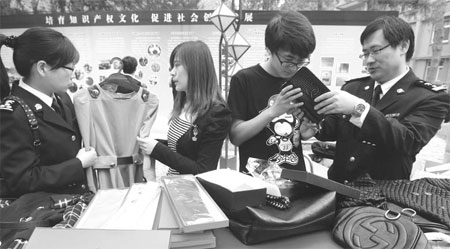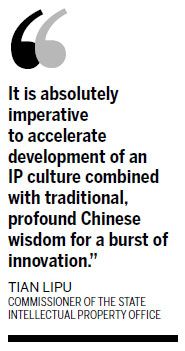|

With World IP Day approaching, Beijing customs show Communication University of China students recently seized infringing goods to illustrate how to recognize counterfeits. Provided to China Daily
|

Nationwide campaign to mark upcoming IP Day
The Chinese government will emphasize continued development of an intellectual property culture on its 2012 agenda, said Tian Lipu, commissioner of the State Intellectual Property Office.
With World IP Day just around the corner on April 26, Tian made the remarks at an inauguration ceremony in Beijing on April 20 for a weeklong nationwide campaign to increase public awareness.
Twenty-five ministerial organizations and a non-government association are members of the campaign's organizing committee, including the administrations of patents, trademarks and copyrights.
With the slogan "fostering IP culture, promoting innovation development", this year's event aims to popularize the crucial concepts of "respecting knowledge, pursuing innovation, behaving with integrity and conforming to the law", said organizers.
A series of simultaneous activities including symposiums, consultancy events, annual reports and training programs are now underway across the country to encourage respect for IP laws.
The globalized economy places increased importance on so-called soft power, which includes cultural influences, said Tian, who also heads the organizing committee.
"Culture is the foundation of soft power and also a fertile ground for the creative industry," he noted. "It is absolutely imperative to accelerate development of an IP culture combined with traditional, profound Chinese wisdom for a burst of innovation."
Many Chinese people who before took it for granted to buy pirated copies of foreign books for much lower prices have increased their awareness substantially over the past decades, he said.
Tao Xinliang, head of the intellectual property school at Shanghai University, echoed Tian, citing the recent headline-grabbing iPad trademark dispute between Apple and Shenzhen Proview Technology.
"Regardless of which side may prevail in the end, the trademark wrangle triggered heated discussion nationwide and has already drawn increased public attention to IP issues," he said, adding that he once received invitations to three seminars on the case on a single day.
In comparison, IP was a new concept to most Chinese 30 years ago. Tao recalled that during a meeting in the 1980s, local government officials had no clue what IP was and asked him to go to the housing property bureau to get the information he sought.
He also remembered a maker of lighters in Shanghai that used the design and logo of US cigarette brand Marlboro. When Tao was hired to tell the Shanghai firm to stop the infringement, the company management was shocked, claiming that they were making lighters, not cigarettes, so it didn't count as infringement.
"Besides, we just provide deliveries in accordance with orders from clients," Yao recalled them saying. "If it is infringement, we have nothing to do with that - the clients should be held liable."
The law professor recounted how "they even claimed that the unauthorized use of the trademark benefited the cigarette maker - it was free advertising".
Today it sounds humorous, a sign that values are changing, experts said.
Commissioner Tian held up the example of an innovation-friendly environment in the United States, where ample investment funds and intermediary services can help young talent start their own businesses. Both areas need improvement in China, he said.
"Creation is a continuous process of confronting frustration," he said. IP protection is the encouragement and guarantee that keeps innovation and dreams alive, he added.
Professor Tao noted that "whether the powerful tool of IP can bring benefits or disaster to China depends on our government, our people and our nation".
wangxin@chinadaily.com.cn
(China Daily 04/25/2012 page17)


